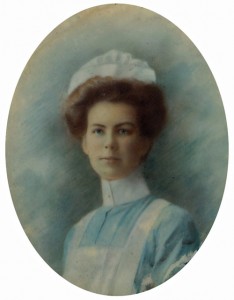Marion Illingworth
David Farrer’s Godmother
 Marion Illingworth was born on 18th. September, 1881. She died in July 1975. She was born in Bradford, the eldest of eleven children of a prosperous wool merchant who made a serious financial misjudgement by dying early. As a result, having been educated for ladylike idleness, she went to London to train as a nurse at Guys from 1904 – 8.
Marion Illingworth was born on 18th. September, 1881. She died in July 1975. She was born in Bradford, the eldest of eleven children of a prosperous wool merchant who made a serious financial misjudgement by dying early. As a result, having been educated for ladylike idleness, she went to London to train as a nurse at Guys from 1904 – 8.
She was a sister at Guys when the Great War broke out and was in the first group of professional nurses to go to Belgium with the “first hundred thousand “. She served in the first field hospitals facing the unprecedented horrors of the retreat from Mons and the fighting at Le Cateau. When I was a child of around nine she described to me the hellish conditions for the wounded, brought in on straw carts, desperately ravaged, faced with a terrible shortage of anaesthetics, medication or the most basic means of cleaning and tending their shattered bodies. She told me – and I can hear her now – how French troops were brought in, already in the death throes of tetanus – “J’ai mal a la gorge ! J’ai mal a la gorge !”
She remained in France until late 1915 when she contracted septicaemia from the infected wounds of those she nursed and was brought back to England with little hope of recovery. But she did. Long before antibiotics, survival was a matter of chance. As a child I gazed in fascination at the part – amputation of her thumb which may have saved her life.
By late 1916 she was back nursing and in 1917, when hopes were high that the USA would join the alliance against the central powers, she was recruited by Jenny Churchill, Winston’s mother, to act as matron at the American Officers’ hospital in Dorset Square, London. There she remained until some time after the end of the war.
In the 1920’s she worked with Marie Stopes, promoting contraception in the desperately impoverished East End and then moved to the Amalgamated Press to edit articles on “women’s issues” in women’s magazines. There she supervised my mother and they remained close friends to the end of her life.
She was my godmother. I spent a great deal of time with her and her sisters in the late 1940s and 1950s and she spoke with a steely clarity of the sufferings of those she nursed in the Great War. I wish I had been old enough to record her or that, when adult, I had given the time to get down what she recalled. Today we still live in the company of her possessions and her endless notes. She is unforgettable.
| The original exhibition display: Marion Illingworth |






